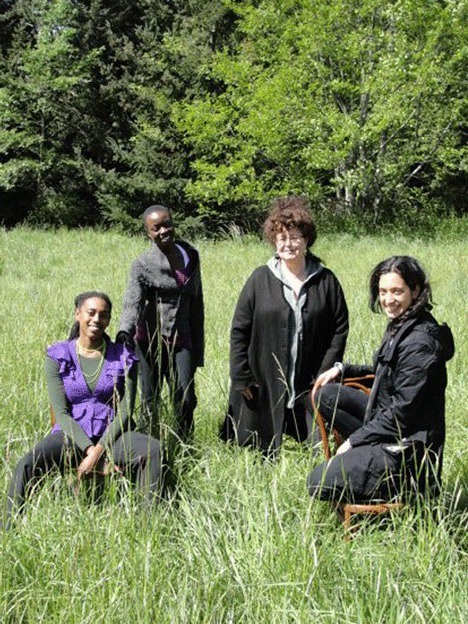Everybody gets lucky in this scenario.
It’s the next installment of the Women Playwrights Festival hosted by the collaborative efforts of Hedgebrook and Whidbey Island Center for the Arts, at WICA at 4 p.m. Sunday, May 16.
The playwrights are lucky because they get to spend weeks developing their newest plays in the pastoral womb of Hedgebrook’s writers retreat. To that end, the writers are surrounded by a staff who are there only to nurture the muse in the writers by providing them their own never-disturbed cabin-in-the-woods and excellent food.
On top of that, the four playwrights currently in residence — Danai Gurira, Sherry Kramer, Lenelle Moïse and Sarah Treem — are accompanied by two dramaturges, Liz Engelman and Christine Sumption. Dramaturges are those under-the-radar advisers, deconstructionists, translators and general text gurus who provide a luxurious sounding board for writers during the development of a play. Playwrights, who are usually left alone to their own devices, will tell you having a dramaturge nearby makes them particularly lucky.
Beyond that is the unique situation of being able to spend time with fellow playwrights while each toils in the same form only to emerge from the woods to eat and share stories with one another.
Hedgebrook residency director Vito Zingarelli said that, this year, the festival’s format has changed so that after each play is launched from Whidbey Island, the playwrights will have the summer to develop the scripts and come together again in August for full readings in New York.
WICA gets lucky, too, by linking arms with Hedgebrook and stepping into a national spotlight by helping to birth plays that will culminate in those professionally directed and acted readings at New York University’s Tisch School of the Arts, and at that bastion of New York City theater, the Public Theatre.
It’s the Whidbey audiences, though, who probably have the most luck. They’ll be able to hear the first excerpts of the newest plays by some of the most exciting playwrights working in contemporary theater today.
This well-crafted festival was founded in 1998 with the simple goal to nurture and support the work of women playwrights. The list of its alumnae is impressive.
Playwrights participating in past festival series include Tanya Barfield (“Blue Door”), Lynn Nottage (“Intimate Apparel”), Theresa Rebeck (“Mauritius”), Sarah Ruhl (“The Clean House”) and Kathleen Tolan (“Memory House”).
“The festival is launching these plays out into the world in a bigger way this year,” Zingarelli said.
“We’re taking it to the next level.”
Indeed, the festival goes through several steps before reaching this first reading stage.
Working in partnership with major regional theatres, Hedgebrook and WICA select playwrights from a group of highly accomplished writers nominated by a national committee, present public readings of the playwrights’ latest works, and then invite the writers to a residency at Hedgebrook for further refinements on their new plays.
Kramer, the first national member of the New Dramatists and a playwrighting professor at Bennington College in Vermont, is working on a play called “A Thing of Beauty.” It’s about the way women measure their time on earth; on how they do the calculus of their value in a culture obsessed with looking youthful.
Moïse is a Haitian-American poet, playwright, vox musician and performance artist who’s current piece, “Eclipse,” focuses on the struggles of Mona, a fiction writer trying to survive in an academic world in which she finds herself the only person of color.
Treem has taught playwrighting at Yale, where she earned both bachelor’s and master’s degrees, and is also a producer of the HBO drama “In Treatment.” Her most recent plays include “Vienna’s Amazing” and “Orphan Island.” Treem is currently at work on a romantic comedy for Miramax Films.
Gurira, an American-born actor and playwright who was raised in Zimbabwe, took a moment out of her writing schedule this week to sit down in the Hedgebrook sunshine and talk about her work.
Having begun a career as an actor, Gurira said she started writing plays in order to tell the African woman’s story.
“I was having a hard time finding anything to perform about my African background,” Gurira said. “It was a case of necessity being the mother of invention.”
Gurira started her new play “The Convert” when she was a writer-in-residence at Hedgebrook two years ago.
“The Convert” is set in Zimbabwe in 1896 during a period of colonization and tells the story of a young girl who escapes a polygamous marriage and becomes a new convert to Catholicism.
Being at Hedgebrook, she said, was the perfect place for the play to incubate.
But there comes a time in the process, she said, when she can’t be alone with a play anymore. Being at Hedgebrook again she has found the perfect antidote to the playwright’s solitude.
“It’s such a quiet, condensed, nurturing time. It’s really something to have fellow playwrights there; someone who gets the process,” Gurira said.
Gurira said the play is one of a series, perhaps a trilogy or maybe more, in which she’ll write about various periods in the history of her ancestral home. She has already begun the next part of the series while putting the finishing touches on “The Convert.”
Playwrighting is the perfect fulfillment, she said, giving women juicy roles that exhaust and challenge them to go beyond where they thought they could go.
Tickets for the 4 p.m. Sunday, May 16 WICA performance are $5. All of the playwrights will lead a lively conversation after the readings.
For more information, visit www.WICAonline.com or call 221-8268 to reserve a seat.
Excerpts from the plays will also be read at 7 p.m. Monday, May 17 at A Contemporary Theatre at 700 Union St. in Seattle; admission is free. Call 206-292-7676 to reserve a seat.


